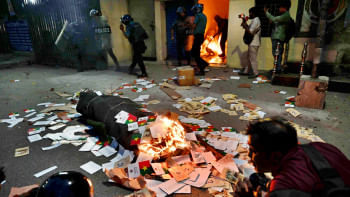Political infighting, Qaeda return can harm Iraq gains: US general
Political discord between Iraq's leaders and a resurgence of Al-Qaeda and Shiite extremists could still torpedo the significant security gains of US-led forces, General David Petraeus said on Thursday as he prepared to hand over command of coalition troops.
Petraeus, who relinquishes charge as the head of coalition forces in Iraq on September 16 to General Raymond Odierno, told AFP in an interview that he was leaving behind a "significantly improved" Iraq but one which was still vulnerable to lethal attacks by Al-Qaeda and Shiite extremists.
The general, credited with successfully carrying out the controversial military "surge" which has curbed the violence in Iraq, expressed satisfaction over latest political developments.
But he warned that the war-wracked country's bitterly divided leaders could still ruin the security gains.
"A resurgence of Al-Qaeda, return of special groups (Shiite extremist cells) in some form and potential political discord turning into violence on the ground" holds the potential to erase these gains, Petraeus said as he sipped coffee in his small but comfortable office at the US embassy in Baghdad.
He said the US troop surge which began in February 2007 backed by the rise of Sunni Arab fighters battling Al-Qaeda has helped to curb the violence but the jihadist group was still not defeated.
"Al-Qaeda has been significantly damaged, degraded and is on the run," he said.
But the group and its network of extremists are still capable of carrying out "lethal, sensational, dangerous and barbaric attacks," he added.
Al-Qaeda in Iraq, the local associate of Osama bin Laden's jihadist group, has been blamed by the US military for most of the brutal violence that engulfed the country in the aftermath of the 2003 fall of Saddam Hussein's regime.
Petraeus said Iraq had left behind the horrific sectarian and insurgent violence that erupted in 2006.
"That horrific level of violence... when average 55 bodies used to be found of people killed only in sectarian attacks... that kind of violence has been virtually eliminated, gone," he said.
"The cycle of violence that was fuelling sectarian violence is just not the feature of Baghdad at this point of time."
The drop in violence which is currently at a four-year low has led to the withdrawal of foreign combat troops from most Iraqi provincial cities, the general said as he showed a chart indicating the fall.
"Actually we are out of the cities with combat forces in probably 14 of the provinces of Iraq... all but Baghdad, Diyala, Salaheddin and Nineveh," he said.
"Even in Tamim (Nineveh) we are largely in the periphery of different cities," he said, pointing to a limited presence also in southern provinces but in the form of small teams engaged in reconstruction or special operations.
On the back of the significant drop in violence, US President George W. Bush on Tuesday announced plans to withdraw 8,000 troops from Iraq by the time he leaves the White House in January.
And the White House hailed Japan's decision on Thursday to halt its air mission for Iraq as a sign of progress.
Tokyo announced it planned to wrap up the mission by the end of the year, citing improvements in Iraq.
Assessing his 19-month tenure as the head of the coalition forces, Petraeus credited the surge strategy of "living with the Iraqis", the anti-Qaeda Sunni Arab fighters and the crackdown on Shiite militias for the dramatic fall in violence.
Citing an example of how two US brigades in a row had lost 50 soldiers in the so-called "triangle of death", south of Baghdad, before the surge began, Petraeus said the current brigade has lost only one soldier in six or seven months -- thanks to the new strategy.
This was achieved "because they (troops) lived with the people. They got rid of Al-Qaeda as people supported them," he said.
"The people told them where weapons cashes are over time. You have to live with the people before they trust you enough to tell you where the bad guys are.”

 For all latest news, follow The Daily Star's Google News channel.
For all latest news, follow The Daily Star's Google News channel. 



Comments